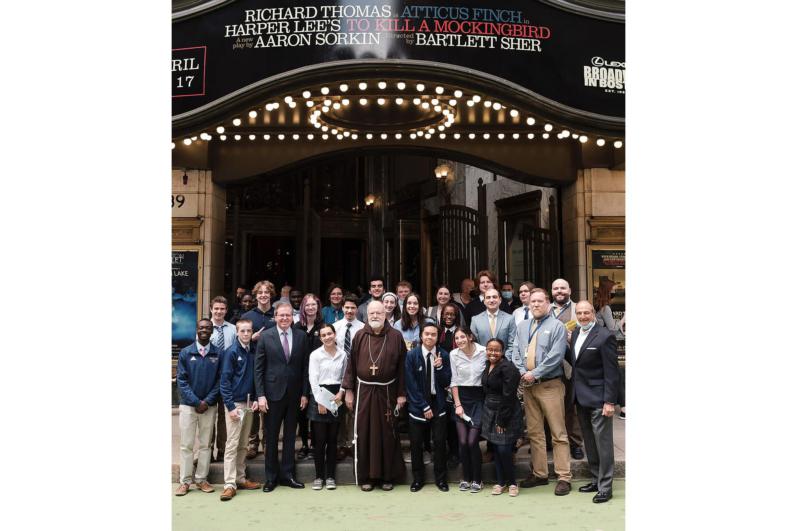Local Catholic school students enjoy the gift of theater
BOSTON -- Open laughter and audible gasps filled the grand hall of the Citizens Bank Opera House as more than 1,500 students, including over 300 from the Archdiocese of Boston's Catholic schools, attended a special performance of "To Kill a Mockingbird" on April 13.
The booked-out performance was organized by Rodman for Kids, a nonprofit that promotes resources and opportunities for at-risk youth. One of their initiatives is the Marilyn Rodman Theatre for Kids program, which gives children opportunities to see live theater, often for the first time in their lives.
This showing of "To Kill a Mockingbird" was Rodman for Kids' first exclusive performance since the start of the coronavirus pandemic. Their last complete theater buyout was for "Hamilton" in 2018. They also took 500 students to see "Hadestown" on its opening night last fall.
Most of the Catholic school students who came to see "To Kill a Mockingbird" were from high schools, though one elementary school sent their eighth-grade class. Cardinal Seán P. O'Malley and archdiocesan Superintendent of Schools Thomas Carroll also attended the show.
As a native New Yorker, Carroll has seen dozens of Broadway shows over the years. But even he found this production "astonishingly good."
"This was as good as it gets in terms of live theater. So I was excited that, for a lot of the kids, it was their first experience, because they saw live theater at its best," he said, speaking to The Pilot on April 20.
Based on the novel by Harper Lee, and adapted for the stage by Aaron Sorkin, "To Kill a Mockingbird" tells the story of a white lawyer in the Jim Crow South who defends a black man in court against a false accusation of raping a white woman. The events are shown through the eyes of the lawyer's daughter and son, making it a coming-of-age as well as a courtroom drama.
Carroll said the story is "an amazingly well-written book and play and movie."
"I think it's an incredible way to explain the culture of the South at the time, and also to have a really robust discussion about issues around race and criminal justice and inequities, which are still relevant to this day," Carroll said.
While enjoying the performance, he also watched the students, who, unlike most theatergoing adults, reacted vocally and unselfconsciously to what was happening onstage.
"It was delightfully refreshing to watch a drama with a bunch of kids reacting in a completely unfiltered and honest way," he said.
Many of the students had already read the book, and all had been told about its subject matter and the kind of language used, such as the N-word.
Nevertheless, Carroll said, "It's a different experience watching it in live theater than it is reading the book. The language comes across as even more bracing or alarming."
During the intermission, Carroll had the chance to speak with some of the students, who said they thought the play was amazing and they were glad they had come.
Carroll expressed his appreciation for the enduring legacy of Don Rodman, the late philanthropist who started Rodman for Kids, and his wife Marilyn Rodman, for whom the theater initiative is named.
"You're getting wave after wave of kids being introduced to theater long after the donors are gone, which I think is great and an amazing legacy," Carroll said.
Amy Rossman, the executive director of Rodman for Kids, said they have introduced more than 75,000 children to "the wonder of live theater" over the past 20 years.
"While they are only at a performance for a few hours, the experience is transformative and opens their eyes to a world they may not have known existed," she said.
Carroll called it an example of "the gift that keeps on giving."
"You never know, with a gift like this, what will spring from it over time," he said.
The impact of seeing a play like "To Kill a Mockingbird" could be starting a conversation in the classroom, raising awareness about racial inequities, or inspiring students to pursue a career in theater.
"You don't know what kid is going to be inspired and the ripple effect of that," Carroll said.
He said he would not be surprised if many of the students went on to participate in school theater productions after attending the show, "because you really see how amazing it can be."



















